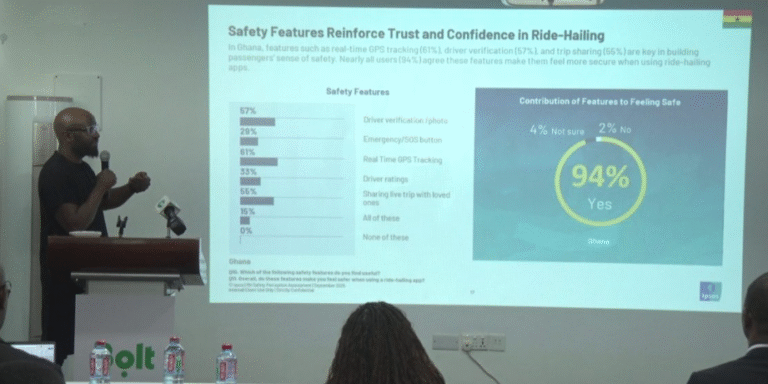A new Ride-Hailing Safety Index Report commissioned by Bolt and conducted by leading research firm Ipsos reveals that 81% of Ghanaians perceive ride-hailing as safer than other transport options.
This shows growing confidence in app-based mobility and its role in improving everyday safety and convenience across cities.
The report, based on surveys conducted in Accra, Kumasi, Tamale, and Takoradi, explores how safety perceptions influence transport choices, the role of technology in promoting trust, and how ride-hailing services are contributing to safer urban travel.
The findings were unveiled at a press briefing hosted by Bolt, which brought together government representatives, road safety experts, and mobility stakeholders to discuss insights from the study and Bolt’s continuous efforts to advance safety innovation and collaboration within Ghana’s transport ecosystem.
Results show that Ghanaians choose ride-hailing primarily for convenience (80%) and safety (45%), underscoring the growing role of app-based mobility in daily life.
Nearly all respondents (92%) said they use ride-hailing when seeking safer or more reliable travel, particularly for late-night trips (70%), when walking feels unsafe (50%), or when they are tired or unwell (46%).
The survey also found that women make up 70% of ride-hailing users in Ghana, with the largest demographic between 25 and 34 years, highlighting how digital mobility supports safe, flexible, and independent travel for young urban commuters.
Safety-enhancing features such as real-time GPS tracking (61%), driver verification (57%), and trip sharing (55%) were identified as the most important tools for building passenger confidence.
In total, 94% of passengers agreed that these in-app safety features make them feel more secure when using ride-hailing services.
Importantly, 52% of respondents believe ride-hailing apps help reduce drunk driving by offering a safe and accessible alternative after social events, contributing positively to public safety outcomes.
“This report gives us valuable insight into how Ghanaians experience and perceive safety when using ride-hailing,” said Sandra Suzanne Buyole, Regional PR Manager, Ghana. “It reinforces that safety is not only a key reason people choose digital mobility, but also an area where continuous investment in technology, driver education, and collaboration with stakeholders can make a lasting difference.”
Adding to this, Ipsos Head of Strategy Africa, Witness Soyinka, said,“The findings show that Ghanaians increasingly associate ride-hailing with reliability, traceability, and accountability, qualities that are essential for building long-term trust in mobility services.
Safety features that enhance visibility and control are the main drivers of passenger confidence, especially among women and younger users.”
The Ride-Hailing Safety Index Report provides a data-driven foundation to inform future improvements in safety innovation and awareness. It will support ongoing partnerships with regulators and the wider transport community to promote safer, more reliable urban mobility across Ghana.
Source:citinewsroom.com


